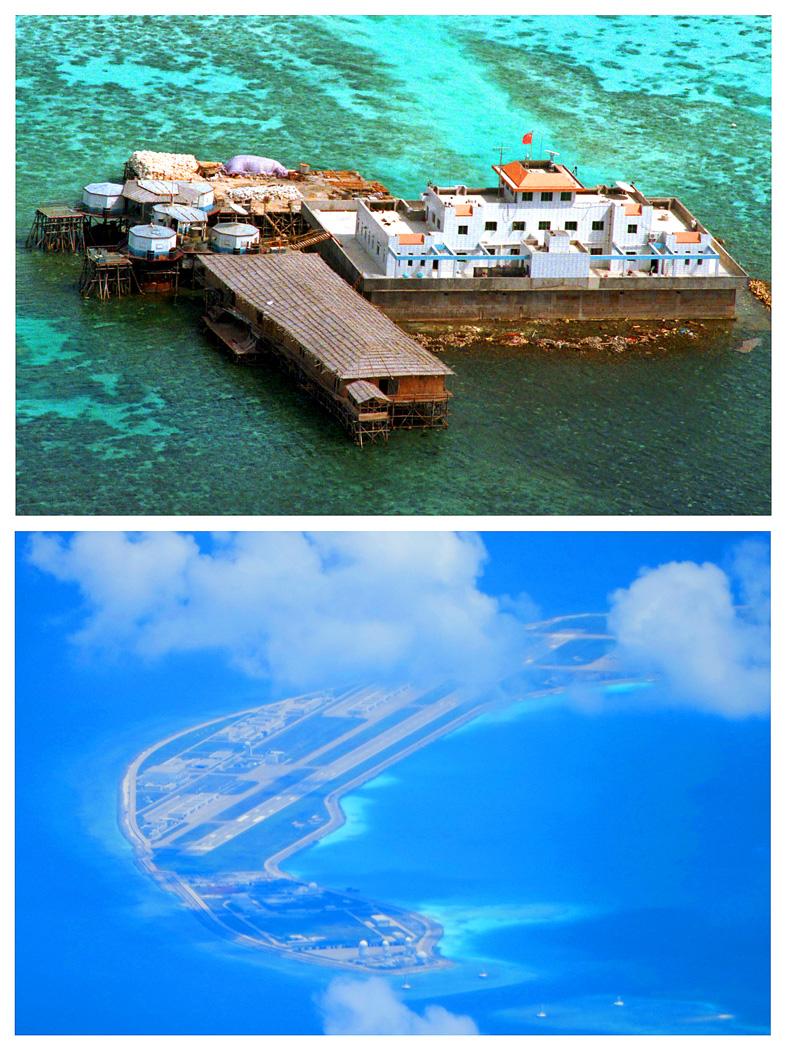China has fully militarized at least three of several islands it built up in the disputed South China Sea, arming them with anti-ship and anti-aircraft missile systems, laser and jamming equipment, and fighter jets in an increasingly aggressive move that threatens all nations operating nearby, a top US military commander said on Sunday.
US Indo-Pacific Commander Admiral John Aquilino said that the hostile actions were in stark contrast to Chinese President Xi Jinping’s (習近平) past assurances that Beijing would not transform the artificially enlarged islands in contested waters into military bases.
The efforts were the flexing of military muscle by the People’s Republic of China (PRC), he said.

Photo: AP
“I think over the past 20 years we’ve witnessed the largest military buildup since World War II by the PRC,” Aquilino told The Associated Press (AP) in an interview.
“They have advanced all their capabilities and that buildup of weaponization is destabilizing to the region,” Aquilino said.
There were no immediate comments from Chinese officials.
Beijing maintains its military profile is purely defensive, arranged to protect what it says are its sovereign rights.
Aquilino spoke with the AP onboard a US Navy reconnaissance aircraft that flew near Chinese-held outposts in the South China Sea’s Spratly Islands (Nansha Islands, 南沙群島), one of the most hotly contested regions in the world.
During the patrol, the P-8A Poseidon plane was repeatedly warned by Chinese callers that it had illegally entered what they said was China’s territory and ordered the plane to move away.
However, the US Navy plane dismissed the multiple warnings and pressed on defiantly with its reconnaissance in brief but tense moments witnessed by two AP journalists invited onboard.
“I am a sovereign, immune United States naval aircraft conducting lawful military activities beyond the national airspace of any coastal state,” the US pilot radioed back to the Chinese.
Aquilino said the construction of missile arsenals, aircraft hangars, radar systems and other military facilities on Mischief Reef (Meiji Reef, 美濟礁), Subi Reef (Jhubi Reef, 渚碧礁) and Fiery Cross Reef (Yongshu Reef, 永暑島) appeared to have been completed, but it remains to be seen whether China will pursue the construction of military infrastructure in other areas.
“The function of those islands is to expand the offensive capability of the PRC beyond their continental shores,” he said. “They can fly fighters, bombers plus all those offensive capabilities of missile systems.”
Washington’s main objective in the disputed region is “to prevent war” through deterrence, and promote peace and stability, including by engaging US allies and partners in projects with that objective, Aquilino said.
“Should deterrence fail, my second mission is to be prepared to fight and win,” said Aquilino, who leads the largest US combatant command with 380,000 military and civilian personnel covering 36 nations and territories.

CHAOS: Iranians took to the streets playing celebratory music after reports of Khamenei’s death on Saturday, while mourners also gathered in Tehran yesterday Iranian Supreme Leader Ayatollah Ali Khamenei was killed in a major attack on Iran launched by Israel and the US, throwing the future of the Islamic republic into doubt and raising the risk of regional instability. Iranian state television and the state-run IRNA news agency announced the 86-year-old’s death early yesterday. US President Donald Trump said it gave Iranians their “greatest chance” to “take back” their country. The announcements came after a joint US and Israeli aerial bombardment that targeted Iranian military and governmental sites. Trump said the “heavy and pinpoint bombing” would continue through the week or as long

TRUST: The KMT said it respected the US’ timing and considerations, and hoped it would continue to honor its commitments to helping Taiwan bolster its defenses and deterrence US President Donald Trump is delaying a multibillion-dollar arms sale to Taiwan to ensure his visit to Beijing is successful, a New York Times report said. The weapons sales package has stalled in the US Department of State, the report said, citing US officials it did not identify. The White House has told agencies not to push forward ahead of Trump’s meeting with Chinese President Xi Jinping (習近平), it said. The two last month held a phone call to discuss trade and geopolitical flashpoints ahead of the summit. Xi raised the Taiwan issue and urged the US to handle arms sales to

State-run CPC Corp, Taiwan (CPC, 台灣中油) yesterday said that it had confirmed on Saturday night with its liquefied natural gas (LNG) and crude oil suppliers that shipments are proceeding as scheduled and that domestic supplies remain unaffected. The CPC yesterday announced the gasoline and diesel prices will rise by NT$0.2 and NT$0.4 per liter, respectively, starting Monday, citing Middle East tensions and blizzards in the eastern United States. CPC also iterated it has been reducing the proportion of crude oil imports from the Middle East and diversifying its supply sources in the past few years in response to geopolitical risks, expanding

Pro-democracy media tycoon Jimmy Lai’s (黎智英) fraud conviction and prison sentence were yesterday overturned by a Hong Kong court, in a surprise legal decision that comes soon after Lai was jailed for 20 years on a separate national security charge. Judges Jeremy Poon (潘兆初), Anthea Pang (彭寶琴) and Derek Pang (彭偉昌) said in the judgement that they allowed the appeal from Lai, and another defendant in the case, to proceed, as a lower court judge had “erred.” “The Court of Appeal gave them leave to appeal against their conviction, allowed their appeals, quashed the convictions and set aside the sentences,” the judges